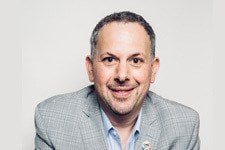The following transcript has been lightly edited and condensed for ease of reading.
Josh Kampel: We’re close. It’s been a long two days, thanks for sticking in here. So Conal’s the president of iHeartMedia’s podcast network. He joined iHeart when they acquired How Stuff Works, where he was president and CEO. For those of you not familiar, iHeart the network has 150 shows, 150 million downloads a month, so a big media network.
How many of you here regularly listen to podcasts? Would you say that’s a typical response?
Conal Byrne: That’s a little more than usual but that doesn’t surprise me for this crowd.
Kampel: So why today? Audio obviously has been around for a long time, people recording and posting content. Why have we seen this huge boom in podcasting in the last couple of years?
Byrne: I think that over the last 10 years, we’ve had this medium that was sort of secretly building with two things happening at the same time. The two sides of the equation were it was attracting the best content creators in the world, I think, both native podcasters, folks in our network like Jake Brennan or Aaron Mahnke or Josh and Chuck from “Stuff You Should Know,” who were born and bred podcasters, but also folks from other mediums like multibook best-selling authors and triple A-lister movie stars were coming to this medium over the last, really five years, but as early as 10 years ago because it felt like a very free medium creatively. I think, to a large extent it reminds content creators of why they got into the content business to begin with. There’s very little daylight in podcasting between a creator and an audience. The other part of the equation was the audiences. It was a very special kind of superfanbase. Podcast listeners are superfans. There is very little drive-by listening in podcasting.
So both sides of the equation to a certain extent were perfect. You had the best creators in the world and the best audiences in the world. It was just a matter of time before this was going to blow up and get on the radar of big broadcast radio companies in our case, iHeartRadio, looking out and saying, “This is probably a permanent new way that at least a subset of audio audiences consume their content. It’s time to move on it.” And I think that spiked it.
Kampel: So for me the turning point was “Serial,” right? It was one of those things that podcasts became mainstream where instead of on a Monday talking about “Game of Thrones” now you had people talking about something like “Serial.” Do you see that? Is there that gateway, that first podcast that converts people over? And are we starting to see things like “The Dropout” and other podcasts helping convert new listeners?
Byrne: Yes, I think what happened was for a long time, for the first four or five years of podcasting, a lot of stuff we were doing were essentially library shows, shows that would publish regularly, once, twice a week, but building libraries of general reference content. That’s how we built a business of shows like “Stuff You Should Know.” Then I think what game-changed the industry thanks to “Serial” was people realized the narrative power of the medium. So it felt all of a sudden like, “Wow, this is actually a lot more akin to TV than I might have thought.” Yes, it has an encyclopedia element to it where I can build a library of the best content in the world delivered through the greatest storytellers, it’s a whole new cool way to consume reference content, to put it as boringly as possible. But it also has this incredible narrative capability too, documentary, essentially. “Serial” really opened up all of our eyes to that, to give them credit. And here we are with, you’re right, shows like “The Dropout,” “2RO,”and “Atlanta Monster” where it’s like if you and I heard that 10 years ago, it wouldn’t even feel like a podcast, but here we are.
Kampel: So when we start to think about the US market of podcast, how do you measure it, give us some sense from a revenue standpoint, from the listenership, how big is the US podcast market?
Byrne: Still relatively small emerging medium. So depending on the numbers you read wherever you read them, it’s somewhere between half a million and a billion dollar industry a year. So that is great for an emerging medium. We’re reaching—about one out of three people are active podcast listeners in the United States, it’s 32%. That’s why when I look around the room, folks who raised their hand, it’s maybe half the room actively listen to podcasts, I’m going to guess. That’s a little high. It doesn’t surprise me, it’s New York, we’re early tech adopters, we like stuff like this. But it’s about one out of three. That is roughly, 90–100 million people in America actively listen to a podcast. That means they only have listened to a podcast once in the last 30 days though, it’s a pretty generous definition of active. It also means that you have, if you look at the other side, as sort of glass half empty, you have a long way to go as a medium when you stand next to established mediums.
Kampel: Like television.
Byrne: Or broadcast radio, our new home. You have mediums that are multibillion dollar industries that reach 90–95% of America every month, you have a ways to go.
Kampel: But when you talk about the monetary value of the market, we had coffee a couple of weeks ago, you talked about China. And we’ve talked a lot in the last couple, actually earlier today about the China market. You gave me a surprising figure of how big the China podcast market was. What was that number?
Byrne: Well it’s interesting because China defines its podcasting industry as a multibillion dollar industry already. I’m sure some folks in the room have read articles on this. There’s a couple of asterisks in this. It’s how does China define a podcast—and there’s things I don’t know about this, by the way. I don’t know how discovery works in the Chinese podcasting market. I don’t know how censorship overlays to the content. But the way that they define a podcast is more educational content for pay. So there are huge libraries of educational content that you can either tip or pay per episode. The reason that that is a well-oiled machine is not because they have better or different content. We have 20,000 episodes in the iHeart podcast library of mostly evergreen content. The reason that we can’t light up that business today as they do in China is because there isn’t an as entrenched mobile payment app system in the United States. So to oversimplify vastly, wallets are not as prevalent in China because iPhones drive much of your financial life. So when I consume a piece of content, it’s easy for me to tip or flip a dollar—or whatever the currency you’re dealing in in whatever country you are—to get an episode of content that I find utilitarian, whether it’s finance 101 or whatever.
Kampel: But one of the things I think we’ve talked about which was an ah-ha moment for me was the content that they’re consuming in China typically we would turn to something like YouTube to get but because YouTube’s not accessible in China, they’re now turning to an audio for that.
Byrne: You’re exactly right, I think there’s a bit of a gap there where there’s a lot of restrictions around YouTube. So you’re right, there are these factories putting out what I understand to be sort of educational or 101 content along everything from how to speak publically better to how to manage your finances better. Very day-to-day mundane but helpful content. You’re right, where we might go to a place like YouTube, it sounds like they’re going to a podcasting industry.
Kampel: So we’re excited and if you read the opening note in the magazine, as we continue to expand at Techonomy, we’re hopefully going to convert the remaining people in the room that didn’t raise their hand that they listen to podcasts by partnering with iHeart to launch a Techonomy podcast that should launch hopefully later this year so that content like you’re hearing on our stage will now be accessible on your commutes and through their platforms. So we’re excited to be partnering with you. And closing thoughts on why more content like what we do is important for the podcast market.
Byrne: I mean it’s a broad answer but look, we’re 10 years into this medium, we’re still an emerging medium. That is such an exciting place to be at a medium. So we take for granted sometimes how rare it is that a new valid content type actually comes along and is here to stay. The jury’s still out on even VR. So for a new content type to come along and all of us to sort of, you know, maybe tentatively but more or less agree, “That’s probably a permanent new content type,” is kind of an amazing thing. So now when you look at the podcasting industry, when you open up anything from the iHeart Radio app to the Apple podcast app, all you’re going to see are gaps. There’s gaps in content. There’s not enough diversity. There’s not enough scripted podcasts. Audio drama is a whole new space that we want to fill. And even after 10 years of us making a lot of great tech content, when we come across a partner like you guys, we’re like, “You guys should be in podcasting, you’d crush it!” That’s what’s fun about the medium is you feel like there’s still a bunch of gaps or white spaces you can come in and fill and actually really win. So we’re at the beginning.
Kampel: Well thanks Conal, we’re excited to be working with you. And hopefully you’ll start downloading the Techonomy podcast later this year so thanks again.
Byrne: Thank you guys.



